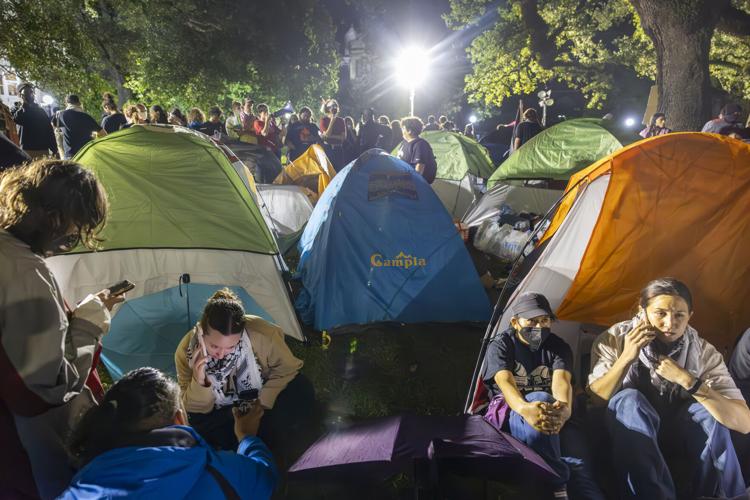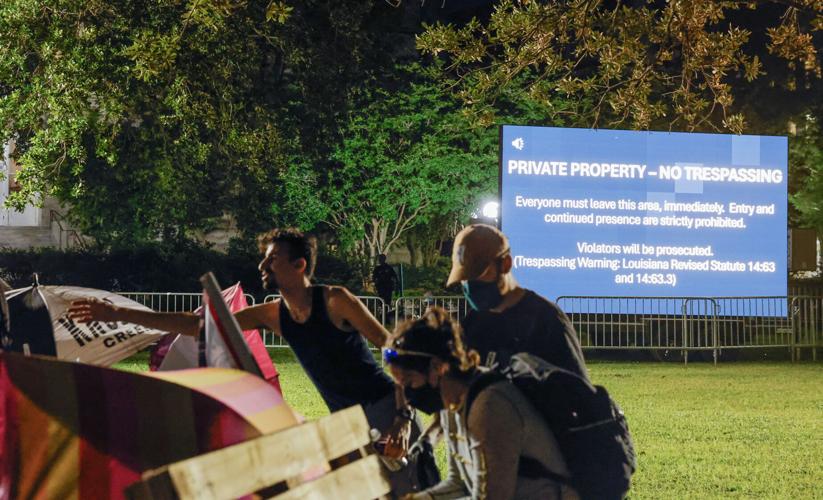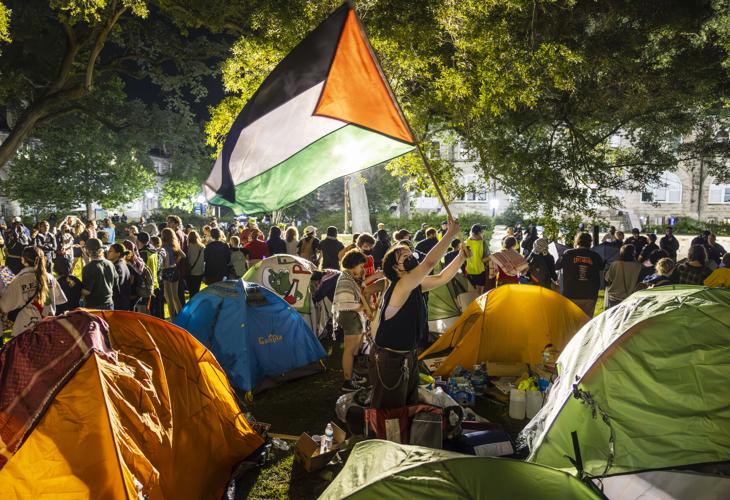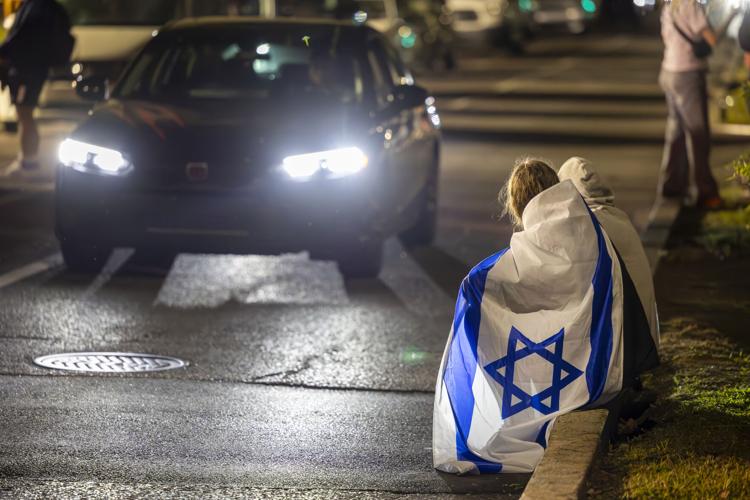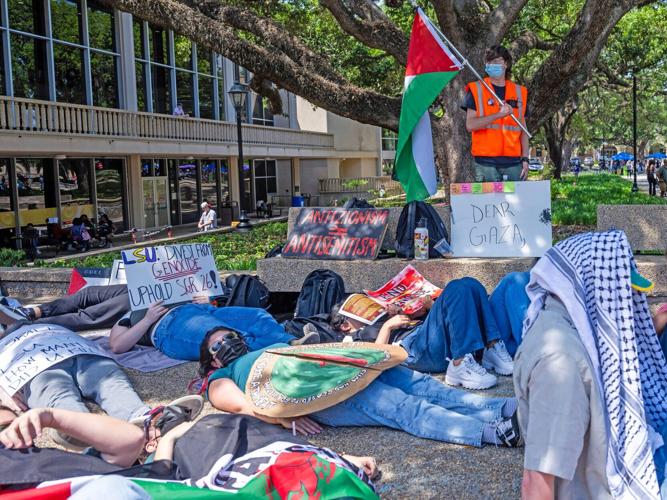We've seen pro-Palestitian protests at LSU, Tulane University, in New Orleans' French Quarter, at Columbia University and elsewhere. More than 2,000 have been arrested across the nation. Some have involved armed police, hospitalizations and violence.
Americans have known protests since before we became a nation. The right to protest and freedom of speech were cherished by our founding fathers. They enshrined those rights in the First Amendment. As a nation, we have guaranteed everyone the rights of peaceful assembly, speech and petition in 1791.
Ever since, well-intentioned people on all sides of issues — including attorneys, judges, legal scholars, government leaders and protesters — have debated what the First Amendment means and how far is too far.

LSU students hold signs to stop the fighting in Gaza and lay on the steps of the student union building in protest on Thursday, April 25, 2024 in Baton Rouge, Louisiana. ORG XMIT: BAT2404251458530113
In the 1700s, before our country became a nation, the 13 colonies flourished. As the colonial infrastructure expanded, the British Crown taxed the colonies. Over time, many colonists began to feel it wasn't right to be taxed without representation in Parliament.
Demonstrations and protests led to an armed revolt, and a new nation.

Counter protestors stand draped in Israeli flags across the street from pro-Palestinian demonstrators at Tulane University in New Orleans late night Monday, April 29, 2024. (Photo by Chris Granger, The Times-Picayune)
In the 1950s and ’60s, the civil rights movement fostered many demonstrations and protests, including the 1965 March on Washington for Jobs and Freedom. The aim was to draw attention to issues of importance to Black Americans and other marginalized peoples — without violence.
The South African anti-apartheid movement was different. Its advocates sought to bring about change by pressuring those with financial ties to South Africa to sever those ties as a peaceful way of protesting lawful segregation in that nation.
It began as a small movement in the 1960s, then it caught on worldwide. It spawned boycotts and protests. But focusing on divestment, anti-apartheid advocates pushed nations, businesses, nonprofits and universities to cut financial ties to South Africa.
Columbia University — the same New York City institution seeing lots of pro-Palestine pressure on its campus lately — was the first college or university to divest in 1985. Other institutions followed. The number grew to more than 100 and kept growing.
A year later, the United States approved the Comprehensive Anti-Apartheid Act. The act established strict sanctions against South Africa and preconditions for rolling back those measures based on ending apartheid.
Anti-apartheid protests and divestment brought an end to the Afrikaans' White rule that had dominated the majority-Black nation since 1948.
Today, Pro-Palestinian protesters' goals vary from campus to campus. Some want university leaders to call for an Israel-Gaza cease-fire. Others want university leaders to call the killing of thousands in Gaza genocide. Still others don't want student protesters arrested or suspended.
Many want universities to cut academic ties with Israel and divest from financial ties to any business, company or investment that helps Israel fund the war — much like the anti-apartheid divestment movement two generations ago.
Israel has enough global cache and economic power to resist a South Africa-like apartheid financial boycott — for now.
But not for long — if we don't see a dramatic change of direction
Meanwhile, in Louisiana and on campuses across the nation, pro-Palestinian protest strategies and tactics have changed. Some, mostly peaceful demonstrations have led to arrests and violence.
A recent Tulane University protest ended as armed law enforcement officers clear a protest encampment. Fourteen were being arrested, including Tulane and Loyola University students. Earlier, on Sunday, 14 protesters were arrested and five New Orleans Police Department officers were hospitalized after scuffles caused injuries at a Jackson Square protest in the French Quarter.
Rev. Dr. Martin Luther King Jr. organized and was the face of many demonstrations and protests. TransAfrica founder Randall Robinson fasted, went on hunger strikes and protested outside the South African Embassy in Washington, D.C. on many occasions. He was arrested numerous times as he fought against South Africa's hard-line apartheid policies.
Both Dr. King and Robinson achieved significant goals via peaceful protest.
Violence evolved from peaceful demonstrations and big asks in the 17th century, the 19th century and the 20th century. Many good things ensued. But violence doesn't always have to be a tool wielded to achieve change.
As my friend Norman Robinson said in his weekly commentary on WBOK this week, "Protesting is about raising voices, not fists. It's about dialogue, not destruction. Resorting to violence detracts from the message and distracts from the urgent issues at hand."
"The conflict in the Middle East deserves thoughtful and constructive engagement, not senseless acts of aggression," he added.
I pray Louisiana will have many public conversations shared by those who have different perspectives — including those who don't want to demonstrate at all, even though they have something to say.

